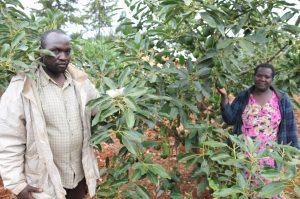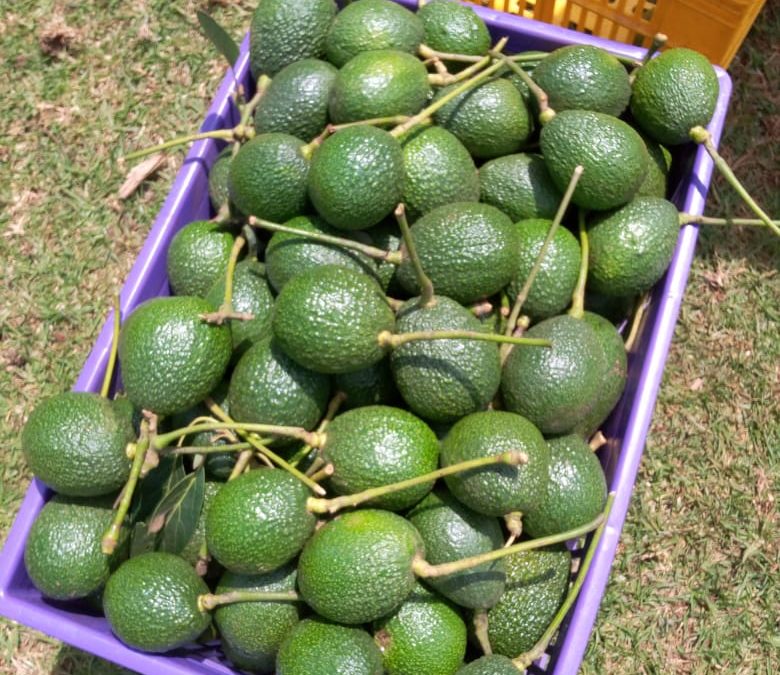Avocadoes help smallholders improve their livelihoods in the highlands of Baringo County, Kenya.
By Grace Koech, Brian Wambua and Robert Kirui
In the remote Kewangoi Village in Baringo County, Rose Kiptoo walks happily around her avocado farm, evidently her passion.
Up until three year ago, this was not the case.

Rose Kiptoo and her husband Mr. Kiptoo showing the avocado trees on their farm
A member of Sigoro Cooperative, Rose and the other members talked about avocado farming with staff of Habex Agro Ltd during one of the Cooperative meetings. Habex Agro pointed out that the environmental conditions in Kewangoi favoured avocado farming. Once planted, the trees start producing fruits during the third year, with a single tree producing 20–30 kg that can be sold at a minimum of KES 50 (about USD 0.46) per kg depending on prevailing market prices.
Habex Agro Ltd., which is regulated by the Government of Kenya’s Horticultural Crops Directorate, engaged 80 members of Sigoro Cooperative on contract farming wherein farmers are given avocado seedlings on credit and offered extension services. Habex Agro ensures that farmers are given the most favourable prices with access to an all year-round market for the next 10 years.
Armed with knowledge and determination, Rose engaged her husband in what she had learned about avocado farming.
‘I persuaded my husband to let us use the section of the farm that was not doing well with maize production and farm avocado instead,’ she recalled.
And in 2018, during the long rainy season during March–May, Rose and her husband planted 40 avocado seedlings of the normal hass and giant hass varieties provided by Habex Agro Ltd.
Two months into the avocado farming, a team of experts from the Regreening Africa project implemented by World Vision Kenya and Habex Agro, visited the group again and provided training.
‘We were trained in avocado tree management, intercropping with tree tomatoes, pests and diseases management, while being assured that the two varieties of avocado were not prone to pest and diseases,’ recalled Rose.
‘Avocado fruit is rich nutritionally and there is a high market demand for fruits and oil used in cosmetics,’ said Sammy Carsan, agroforestry scientist at World Agroforestry (ICRAF). ‘Farmers could be tempted to replace traditional cash crops, such as coffee, given past experiences, such as poor market development and low profitability’.
New smallholder fruit growers need extension support to grow avocado in agroforestry systems that ensure sustainability through sound use of local resources rather than in monocultural systems that expose them to production risks, such as pests and diseases, high demand for external inputs and may even lead to total neglect of staple food production, a backbone of rural economies.
David Too, another avocado farmer, believes the training he received from the experts in management of avocado seedlings and following what he was taught has led to his avocadoes growing healthily.
‘I had allowed grass to grow around my avocado trees and they did not look good,’ he said. ‘During the training, the facilitator advised us to weed the plants regularly to avoid grass undergrowth as it competes for nutrients with the avocado trees. It was then that I understood why the avocado plants on my farm looked pale.’
Convinced that avocado trees will be profitable, Job Koiluk, another avocado farmer, has partitioned his farm among his wife and children so that each of them can manage the trees, sell the fruits, and earn an income.
‘The sizes of harvested avocado fruits are commendable: about 14–22 cm,’ said Robert Kirui, director of Habex Agro Ltd. ‘They have no diseases and are clear with no marks.’
The clear guidelines provided have made Rose and others better avocado farmers. Three years into the venture, the 80 farmers in Kewangoi harvested 15,000 kg of avocadoes, ready for export.
Surely, Rose will continue to be passionate about her avocadoes.
This story was produced with the financial support of the European Union. Its contents are the sole responsibility of Regreening Africa and do not necessarily reflect the views of the European Union.

